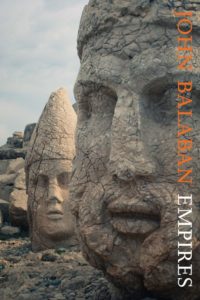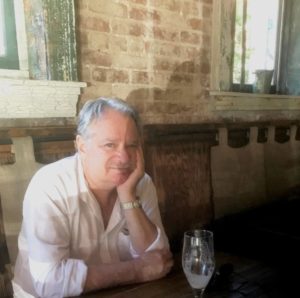With Empires, the latest poetry collection by John Balaban, there’s a way to start reading it that helps bring clarity to what he’s writing about. Start with this poem, which appears about halfway through the work’s 31 poems.
The Uses of Poetry
The poets descend like locusts
wings filmy, bright, whirring ambitions

for tended lushest leaf, all foliage,
the fury of their wingbeats
sickening and familiar:
a swarm out of Egypt
eating everything in their path.
But some sing. The Cicadidae,
burrowed deep in dark earth for years,
crawl out to creep up trees, eating nothing,
inching toward sunlight,
abandoning their husks, pitching out
cascades of calls high in the treetops.
It’s a bit startling, to see poets compared to locusts and then to their cousins the cicadas. Was he passing some kind of judgment on what poets do or how they behave? Rereading the poem a few times told me I was overreacting. What he’s saying is that anything about life is fair game for the poet; a few poets burrow deep and then emerge with calls that strike us all. That metaphor of locusts is graphic enough to grab attention.
In Empires, Balaban both grazes almost greedily upon green expanses and burrows deep, with ideas and themes shedding their protective husks as they emerge into the light. A large part of the work does indeed concern empires —the Spanish Empire, the Persian Empire, the British, the Chinese, the American, and even the empire of terrorism. It also considers wars, the handmaiden to empires, like the American Revolution, the Persian War of antiquity, and the Vietnam War.

John Balaban
He’s mining history poetically to make a point, or several points. He’s asking what brings people together as a nation, an empire, or even a community. He’s probing the idea of common good, and wondering what common good would all of us abandon everything to defend? He’s acknowledging that history and events are often motivated by greed, as with the Spanish conquistadores’ search for Cibola, the city of gold. And he returns to Vietnam, after the war is long over, looking for places and scenes embedded in memory but finding an overlay of massive change.
The collection also includes poems of a more personal and familiar nature. He writes about finishing a novel after a long delay in the writing process. He writes about nature — tidal pools, starlings, a coyote at sunset, and the beach. He writes about the poet retiring and reading Ovid by the Black Sea. (A question Balaban doesn’t answer: does a poet ever retire?)
Empires is a rather marvelous collection, filled with ideas and insights that are both obvious and profound.
Balaban has published 13 collections of poetry and prose. He’s received the Lamont Prize from the Academy of American Poets, a National Poetry Series selection, two nominations for the National Book Award, the William Carlos Williams Award from the Poetry Society of America, a Guggenheim Fellowship, and several other recognitions. He is also a translator of Vietnamese poetry and a past president of the American Literary Translators Association.
Poets may not think of themselves as locusts or cicadas, but Balaban might say life is there for poetic feasting and even diving deep. All’s fair in love, war, and poetry.
Photo by A Canvas of Light, Creative Commons, via Flickr. Post by Glynn Young.
__________________________

“I require all our incoming poetry students—in the MFA I direct—to buy and read this book.”
—Jeanetta Calhoun Mish
- Longfellow’s “Paul Revere’s Ride”: Creating a National Legend - April 17, 2025
- Poets and Poems: Katie Kalisz and “Flu Season” - April 15, 2025
- Poets and Poems: Michelle Ortega and “When You Ask Me, Why Paris?” - April 10, 2025

L.L. Barkat says
Sounds amazing. Has Rick read these? (Maybe you could recommend. 🙂
Glynn says
Several of the poems are on the longish side, but there a number that would be good for the newsletter.